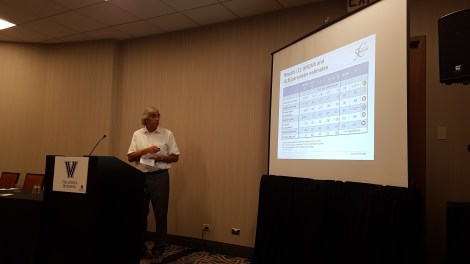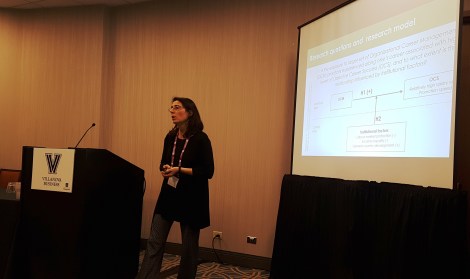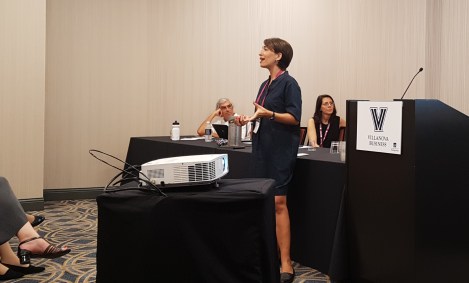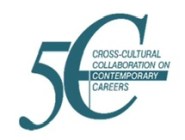About the authors:
Maike Andresen is Professor of Human Resource Management and Organizational Behaviour at the University of Bamberg, Germany. You can contact her at: maike.andresen@uni-bamberg.de
Adam Smale is Professor of Human Resource Management at University of Vaasa, Finland. You can contact him at: adam.smale@univaasa.fi
This was the title of a research symposium recently held at the Academy of Management Meeting 2018 in Chicago on Tuesday, August 14. The symposium was mostly comprised of 5C paper presentations and gave an overview of some of the results that are emerging from our research on international careers. We were delighted to learn that this symposium was runner-up for the Best Symposium award from the Careers Division, as well as one of the finalists for the All-Academy Best Symposium award from the International Theme Committee. This was encouraging feedback on the quality of our work and our international reach!
The basic premise of the symposium, and much of our 5C work more generally, is that research on ‘global careers’ to date has been dominated by work on the career attitudes and behaviors of expatriates, and other globally mobile professionals. Whilst this represents an important body of work, our understanding of careers in the international context remains piecemeal given its relatively narrow focus, limited consideration of the perspective of multiple stakeholders (other groups of employees, organizations), and lack of attention to context. This symposium included a collection of six papers that represent a much broader spectrum of research on careers across national contexts. In addition to the mainstream research on global careers, we featured research from two emerging, complementary research streams: comparative careers, and organizational career management across countries. All the presentations are downloadable at our publications page or directly here: 5C Symposium Overview (Janine) Occupational differences (Wolfgang) Career Success & Life Satisfaction (Dominik) OCM & Objective Career Success (Silvia B) Age & employability (Silvia DR) International Mobility & Career Success (Maike).
Comparative careers:
Comparative careers research takes a broad view on international careers. It includes various contextual factors such as culture, institutional arrangements or national boundaries and focuses on comparative analyses of career meanings and career systems between various contextual settings. It highlights the role of context and structure, counterbalancing the ‘actor-only’ tendency in careers research to date. Countries may have different labor markets and education systems, different employment laws and trade unions, and different cultural expectations, all of which can result in different career models in terms of, for example, career entry and development, career paths, career success factors, and career transitions within and between organizations. While the field is making progress, there remains little systematic research in this area to date.
The two symposium presentations in this category focused on career success for specific occupational groups.
| ‘The Meaning of Career Success across People- vs. Technology-oriented Occupations: Empirical Evidence from German-speaking Europe’ Using 5C data from Germany, Austria, and Switzerland, differences in the meaning of career success across three occupations were examined. The study proposes and tests differences in the perceived importance of seven career success dimensions among teachers, health-care/social workers, and IT professionals. |
 |
| ‘Young, Blue and Happy? Career Success and Life Satisfaction among Young Blue-Collar Workers around the Globe’ Using 5C data from millennial respondents across 26 countries, this research studies the link between three dimensions of career success and life satisfaction among blue-collar workers – a group that has not been widely studied within careers research. The paper also examines the moderating role of occupational group, by comparing blue-collar workers with other occupational groups. |
Organizational career management across countries:
In terms of organizational career management across countries, research is yet to disentangle the effects of different organizational career management (OCM) practices, and the extent to which their effectiveness is context dependent. OCM comprises practices aimed at supporting the professional development of employees and include, for example, career counselling, career planning, career workshops, formal training, assessment and development centres. Existing empirical research mainly focuses on studying the effects of isolated OCM practices on different measures of career success and has produced inconclusive findings. One potential reason for this may be due to the fact that most of these studies are carried out within single countries. There is a range of country-level cultural and institutional factors that may affect the returns organizations can expect from organizational investments in employees. Country context is also likely to shape how employees react to such investments, what they expect from their organization and how they view career success (Briscoe, Hall, & Mayrhofer, 2012). It is thus surprising that the role that OCM plays in contributing to career success within and across country contexts remains under-researched.
There were two papers addressing this theme in the symposium, and they examined the impact of organizational career management on a range of critical career outcomes.
| ‘Sponsored Mobility in Context: The Impact of Organizational Career Management on Objective Career Success and the Moderating Role of Institutional Factors’ This paper examines (i) the impact of Organizational Career Management practices on objective career success (i.e., promotion speed, salary), and (ii) the moderating role of institutional variables (human development index, employment protection legislation, social mobility index). |
 |
| ‘Employability as a Function of Age and Organizational Career Management Practices: A Cross-country Comparison’ The extent to which age impacts perceptions of employability is investigated, and whether Organizational Career Management practices alleviate the expected negative relationship between age and perceived employability. The study further explored these relationships across thirty countries and found very little variability in the negative effects of age and in the buffering effects of organizational career management practices. |
 |
Global careers:
Lastly, drawing on the global careers stream, the final two papers investigated the consequences of international mobility.
| ‘Does an International Career Pay Off? The Impact of International Work Experience on Employability and Career Success’ The authors investigate the relationship between international work experience and various career outcomes. A positive relationship between international work experience and career success has long been suggested, but the question has not yet been studied systematically by involving third variables such as employability. They suggest that due to its potential to develop individual career capital, international work experience is associated with increased employability, which, in turn, is related to positive objective and subjective career outcomes. |
 |
| ‘Subsidiary Managers and Code-switching’ In the last presentation, a conceptual contribution, the psychological consequences of code-switching are examined, i.e. alternating on purpose between behavioural patterns, for managers who move across international boundaries during their careers. Specifically, the presenters argue that both vertical code switching and cross-cultural code-switching can foster role conflict. |
The symposium organisers would like to thank all those involved for what ended up being a thought-provoking and successful symposium!
Footnote:
All five empirical papers presented at the symposium stem from the 5C Consortium and draw on quantitative data on careers across different countries. The large, multi-country, individual-level dataset builds on earlier qualitative work from this consortium (Briscoe et al., 2012). Back-translated questionnaires were administered in all participating countries during 2014-2016 by national representatives of the research collaboration using pre-determined screening criteria to achieve heterogeneous within-country samples. Each national sample includes individuals who have at least two years of post-educational work experience, is gender balanced and has close to equal age distribution, and represents four occupational categories: managers, professionals, clerical/service workers, and skilled workers. With relatively equal sample sizes across countries, the current global sample comprises over 18,000 participants from 30 countries representing all of GLOBE’s 10 cultural regions. A key part of this research was to develop and use a new career success scale, which would enable the comparison of career success across countries. Seven dimensions of career success have been identified as culturally invariant across all GLOBE’s clusters: Learning and Development, Work-Life Balance, Positive Impact, Positive Work Relationships, Financial Security, Financial Success, and Entrepreneurship.







